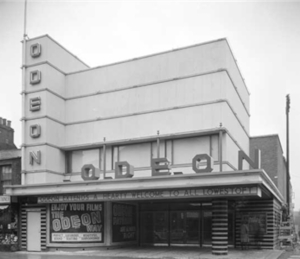Doreen Lyell (DL-95-216)

The Odeon, Lowestoft. Public Licence via cinematreasures.org
In September 1995, Doreen Lyell answered a call in the East Anglian press for volunteers to take part in Cinema Culture in 1930s Britain, and eventually became one of the twenty-one individuals, couples and groups living in that region who were interviewed during the last months of 1995. Miss Lyell was born in Lowestoft, Suffolk in 1922. Her mother was a housewife and her father a jobbing labourer who did short-term and seasonal work--gardening, maintaining fishing boats, and suchlike; in later life he worked for the local council as a rates collector. After leaving school at fourteen, Miss Lyell worked for many years as a bookkeeper at the Co-op before leaving to become her parents' full-time carer. She was interviewed at her home in Pakefield, Lowestoft on 19 October and 13 November 1995.
In her first interview Miss Lyell talks about her family background and her father's various jobs. She went to the pictures regularly, she says, describing the experience as "really lovely". She feels that the films of her youth had a simple moral code and offered entertainment, enjoyment, and "a bit of glamour in a dull world"; and recalls particularly enjoying westerns and musicals and disliking horror and violence in films. She names some favourite stars and talks about the cinemas in Lowestoft she went to with her friends. She takes the interviewer through the film scrapbooks that she has promised to donate to the project: "I just want them to go somewhere where they can still be of some use, you know. Because I've got no family and nobody is interested in them any more. I wouldn't like to see them thrown away." The second interview is focussed on the wider social aspects of cinemagoing. For her generation, says Miss Lyell, cinema was the main entertainment, a regular, essential part of life. Going to the pictures was about learning and broadening one's horizons, she adds, and films at that time offered more profound messages than they do today. She insists that her peers had no desire to change the lives they had: rather, the simple enjoyment of the pictures "helped us through the week". While fully aware that they presented a fantasy world, the films, film magazines, and photographs of stars seemed to be "addressed to us alone". She discusses the qualities that attracted her to particular films and her feelings about favourite stars; and reiterates that her generation got so much out of cinemagoing because, unlike today's youngsters, they had little else in their lives. She points to the powerful international appeal of Hollywood cinema and the superior quality of those working in the studios, noting that the film industry created many jobs all over the world.
Interview transcript | Listing of cinemas, films and stars mentioned
Audio-synced interview (2 of 2)
Interview transcript | Listing of cinemas, films and stars mentioned
Documents, Memorabilia and Related Links
East Anglia home pageScan of letter (DL-95-216PL001) | Transcript
The Grand Theatre, Kirkley (cinematreasures.org site)
Trailer from 'The Good Earth', 1937 (YouTube)
Extract from 'A Tale of Two Cities', 1937 (YouTube)
Donated Scrapbooks
Photograph Album - 1930 Stars
Related publication:
Extracts from and discussion of Miss Lyell's interviews appear in An Everyday Magic, pp.149; 230-231; 232;233:
Kuhn, A. (2002). An Everyday Magic: Cinema and Cultural Memory (London: I.B. Tauris).